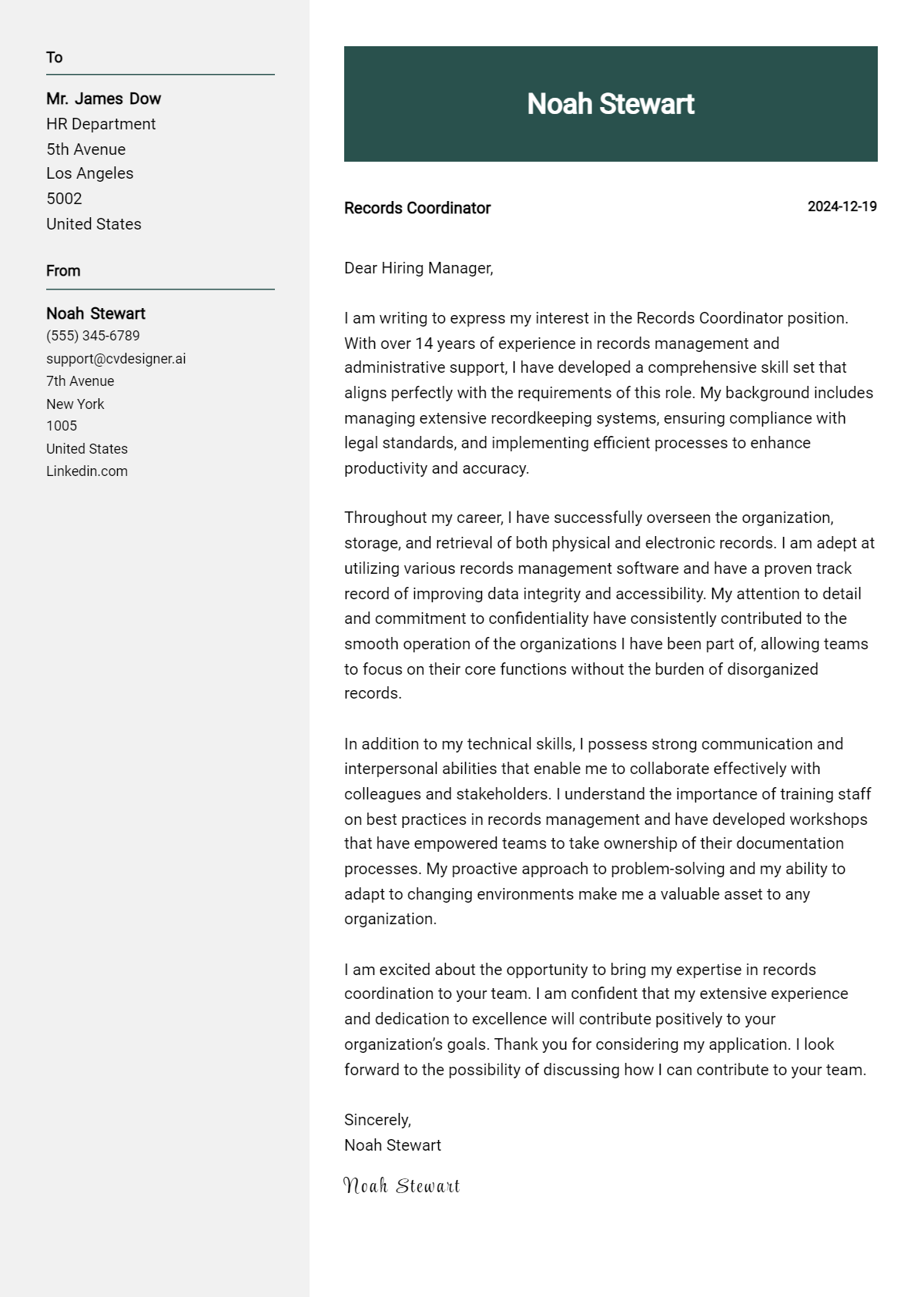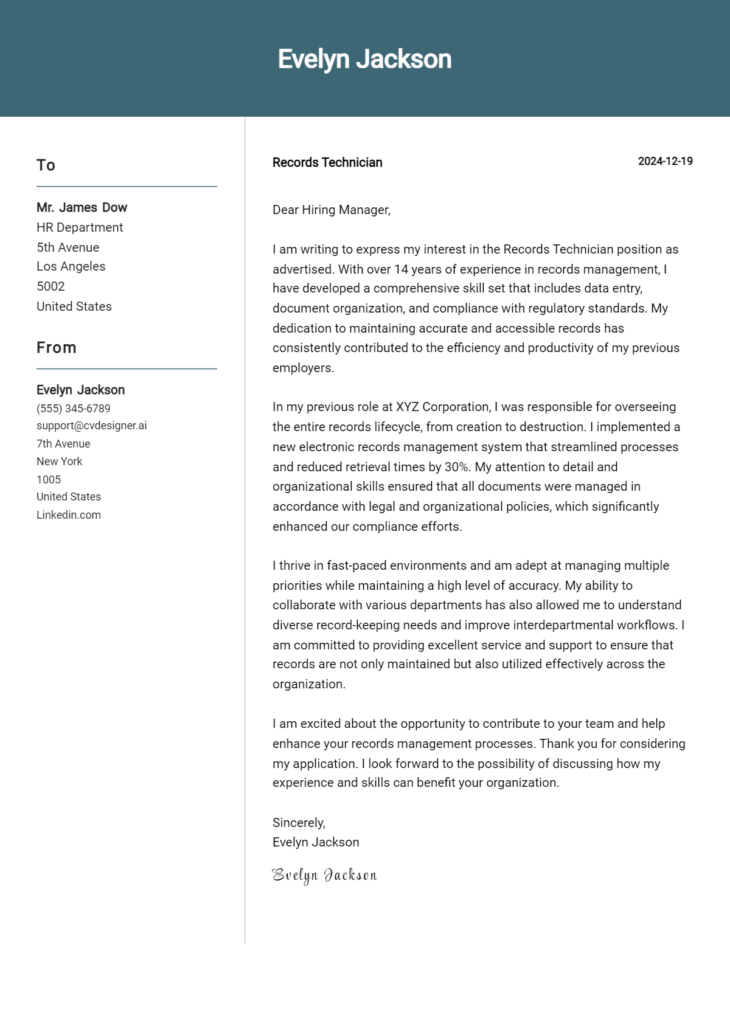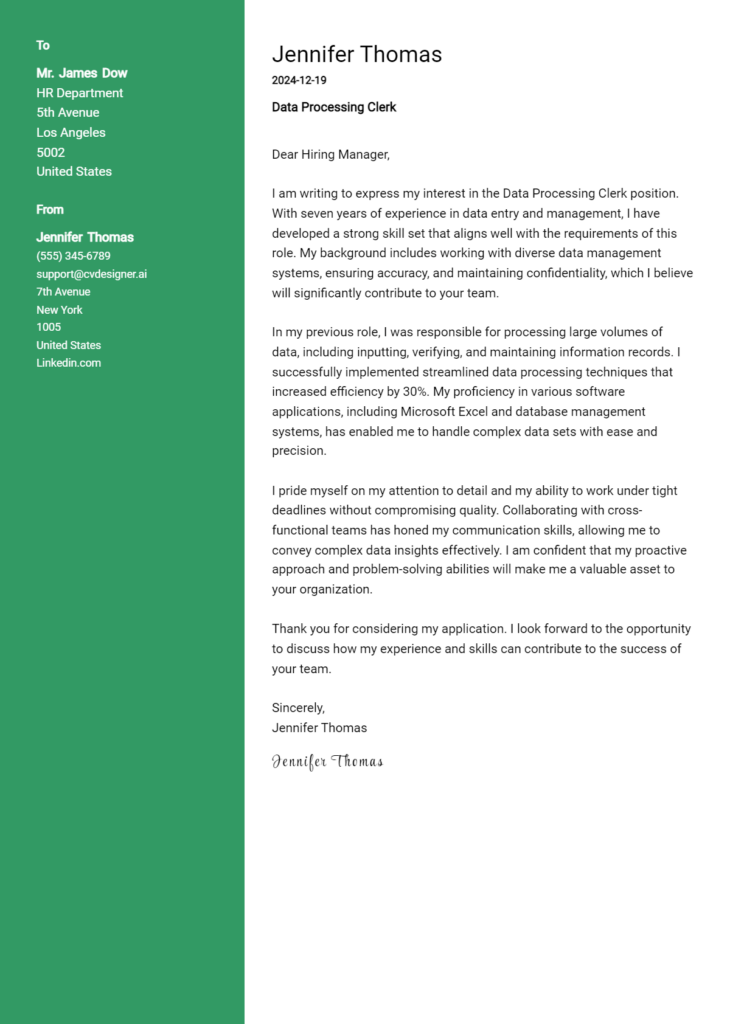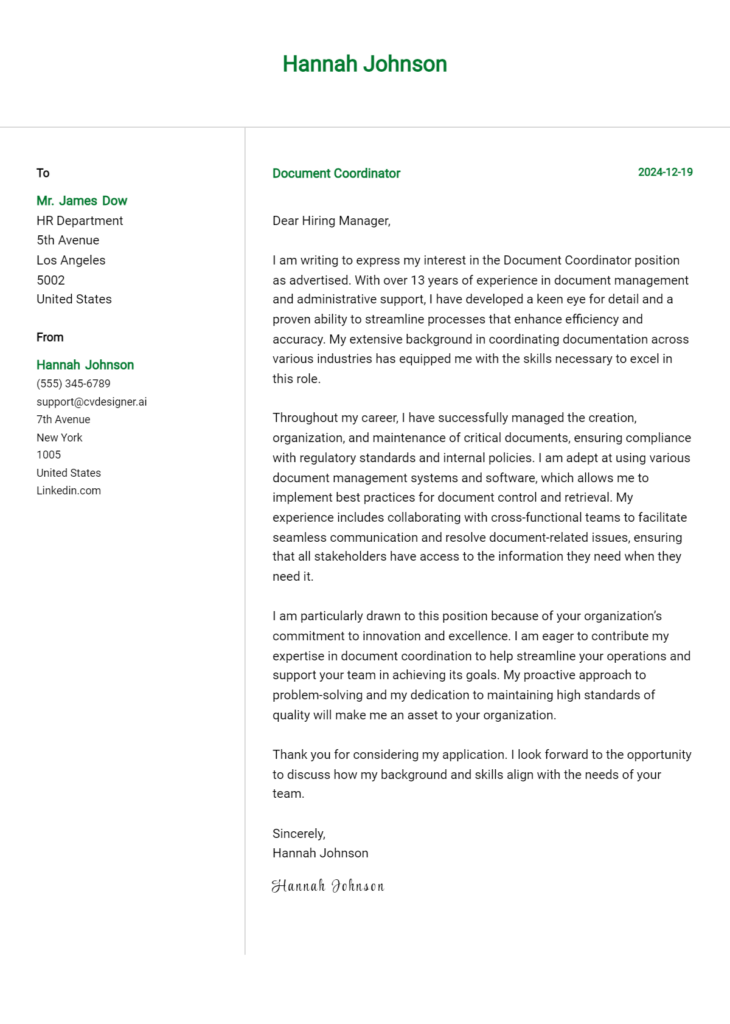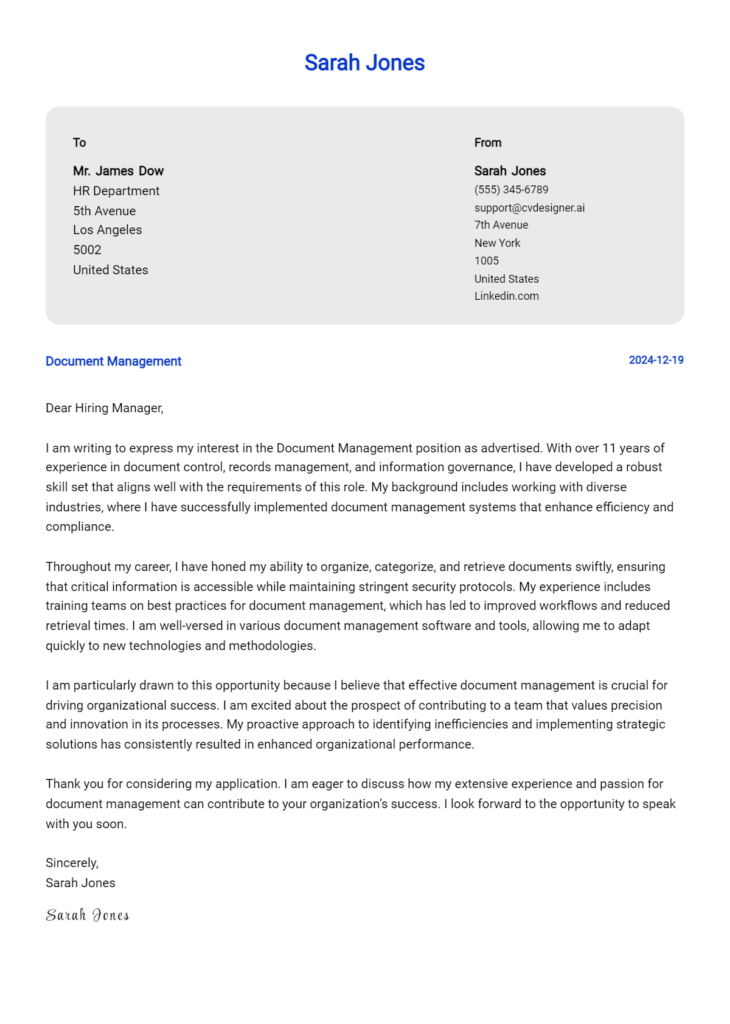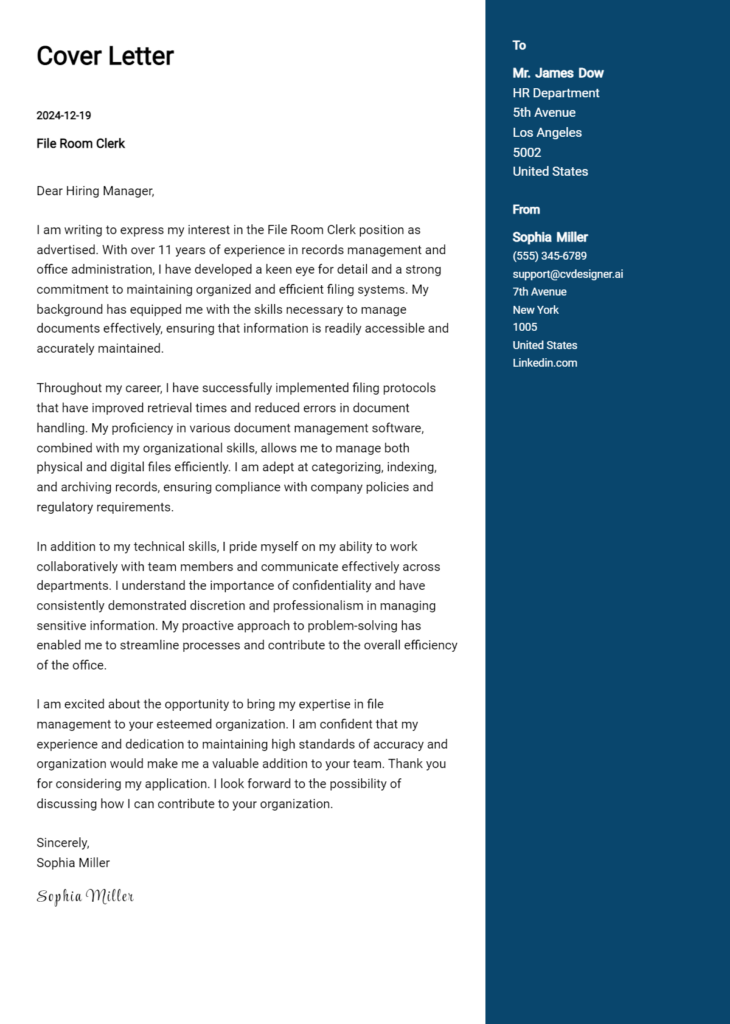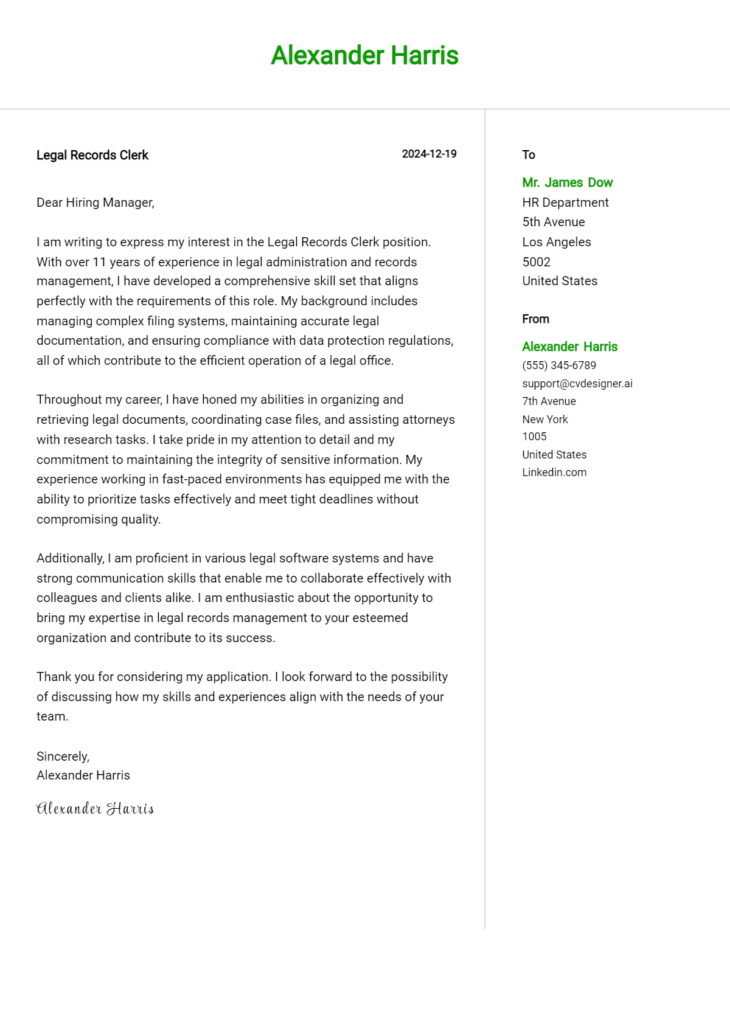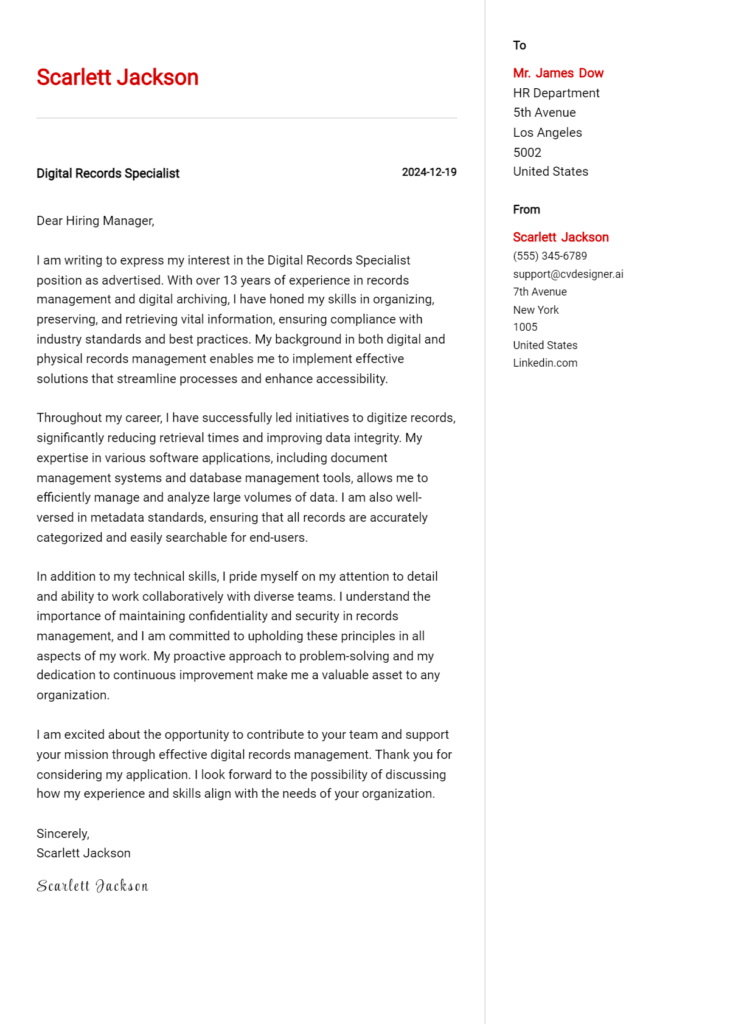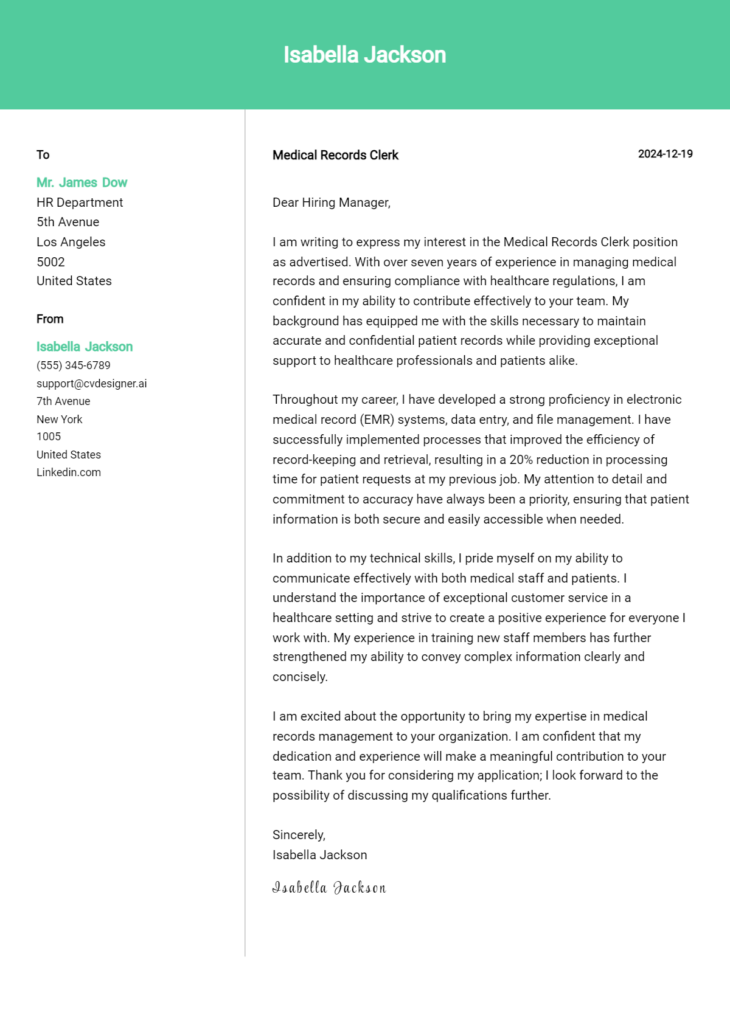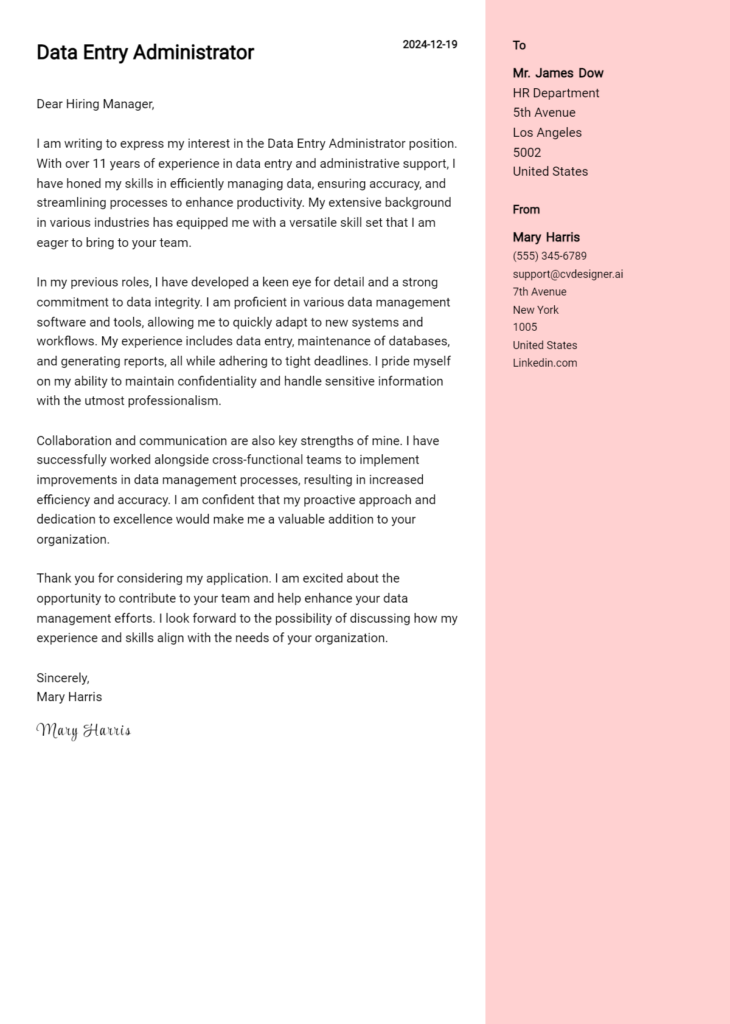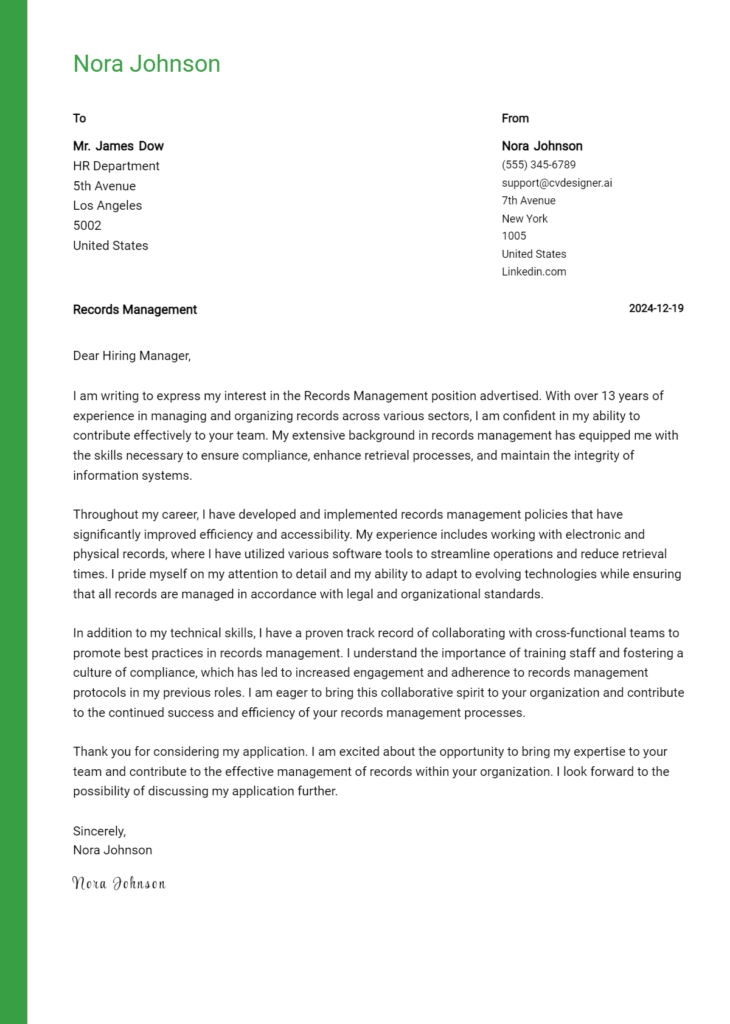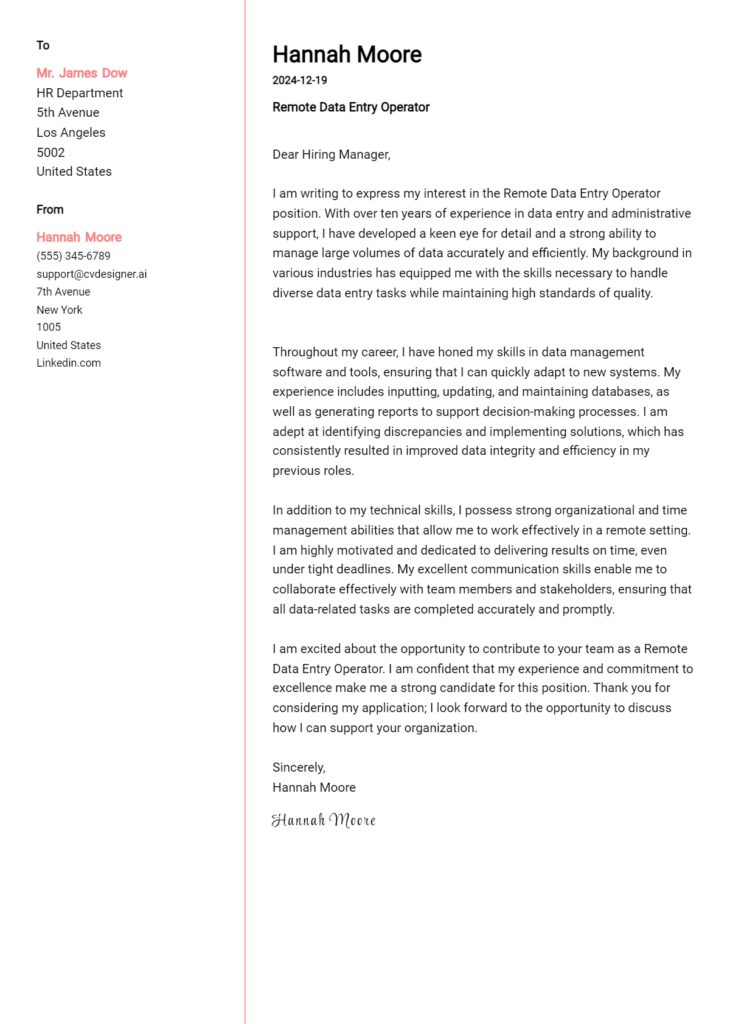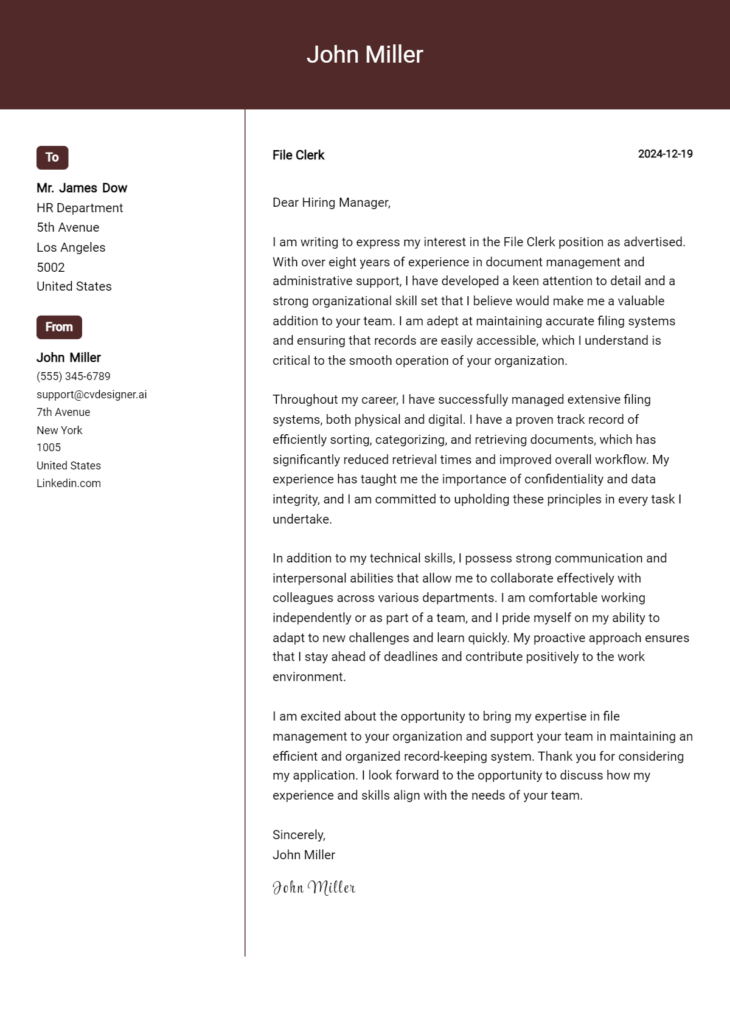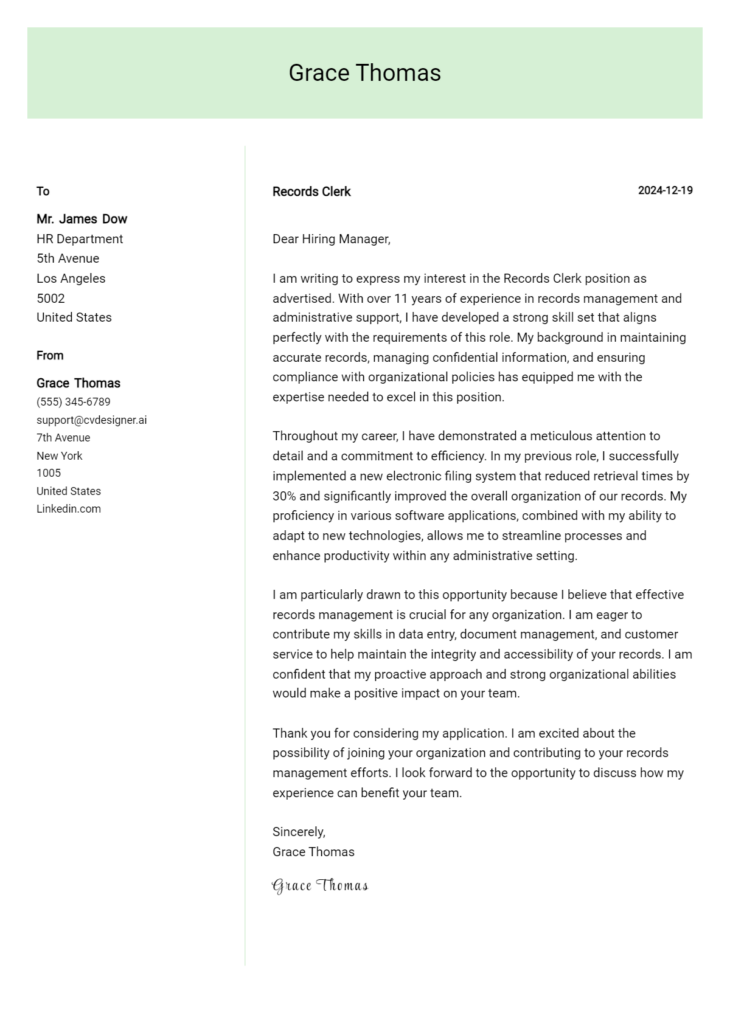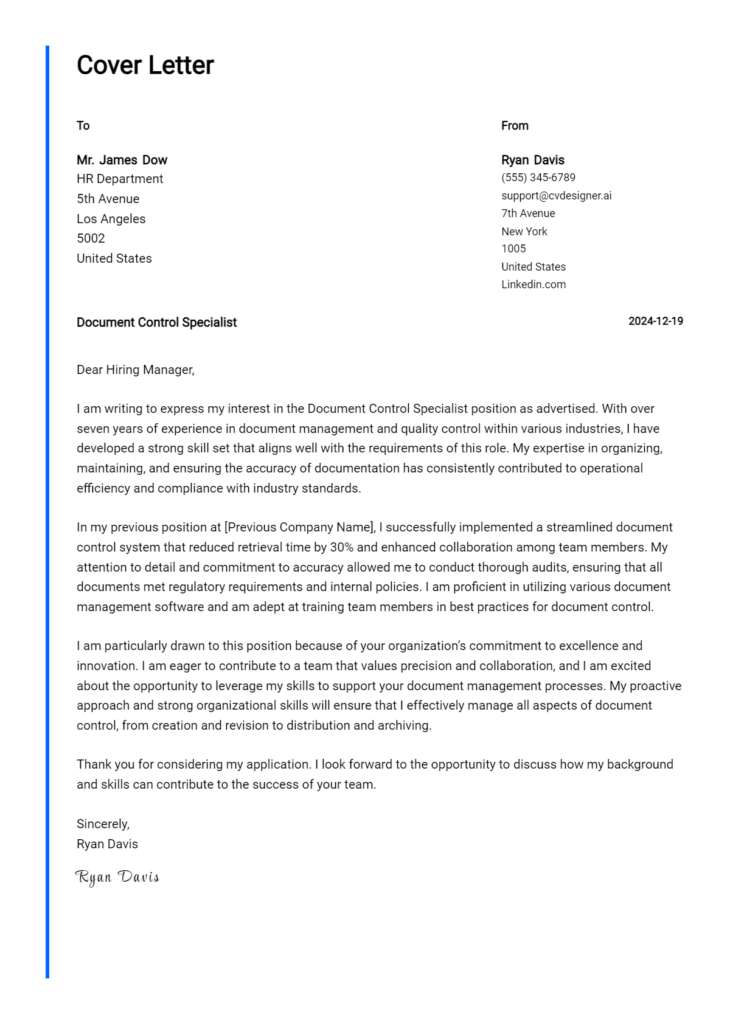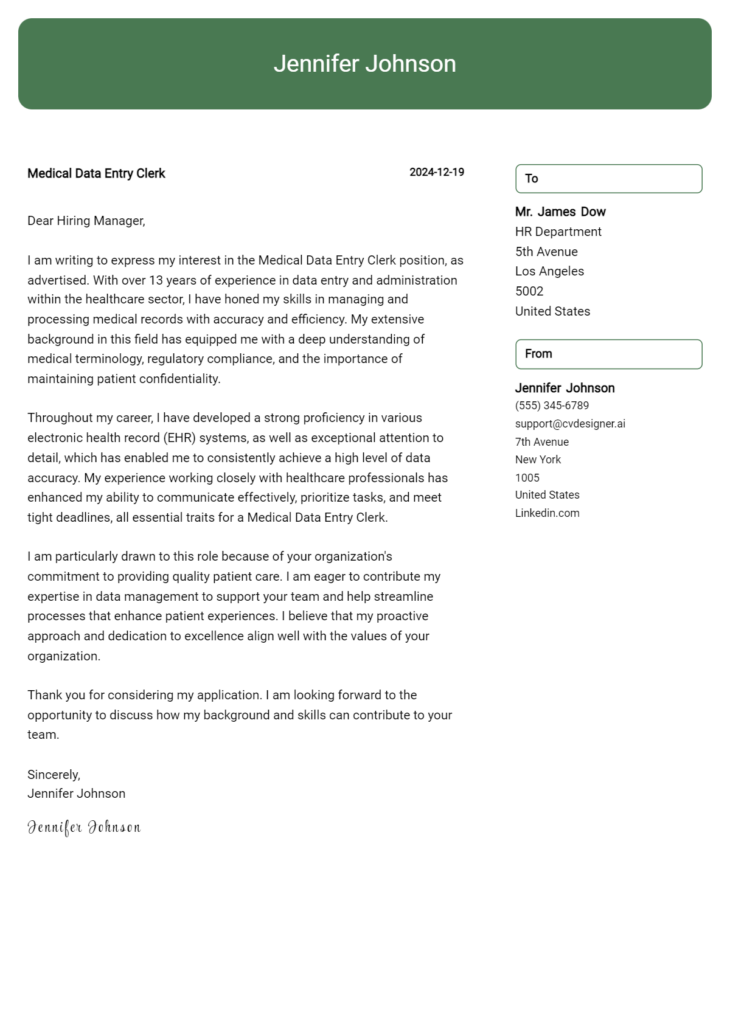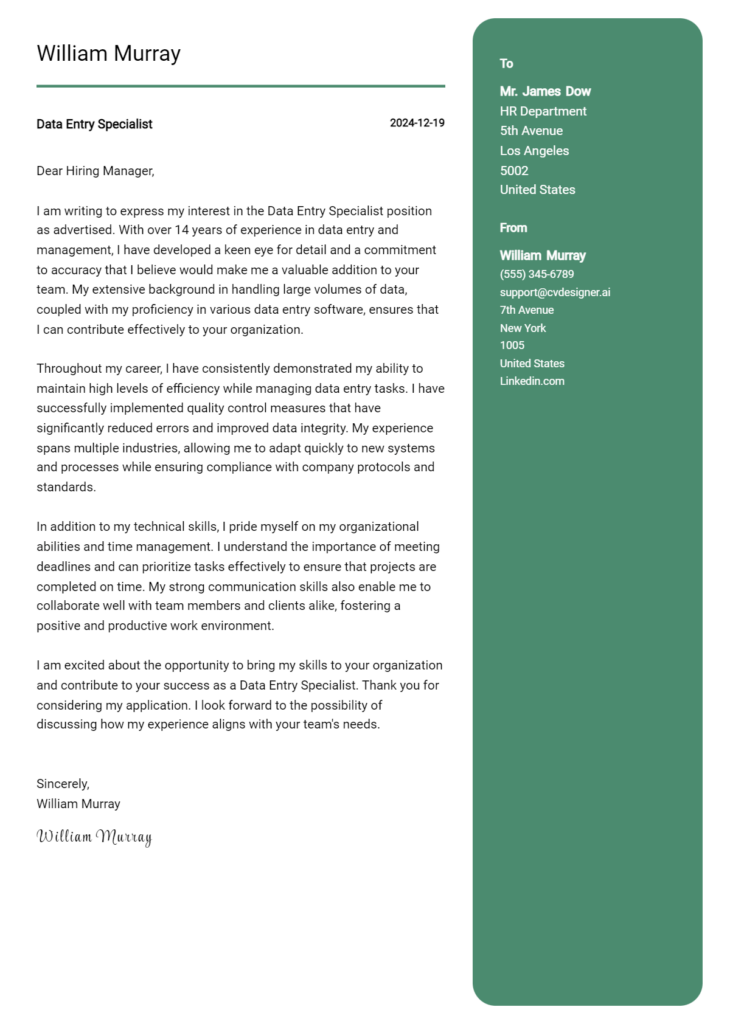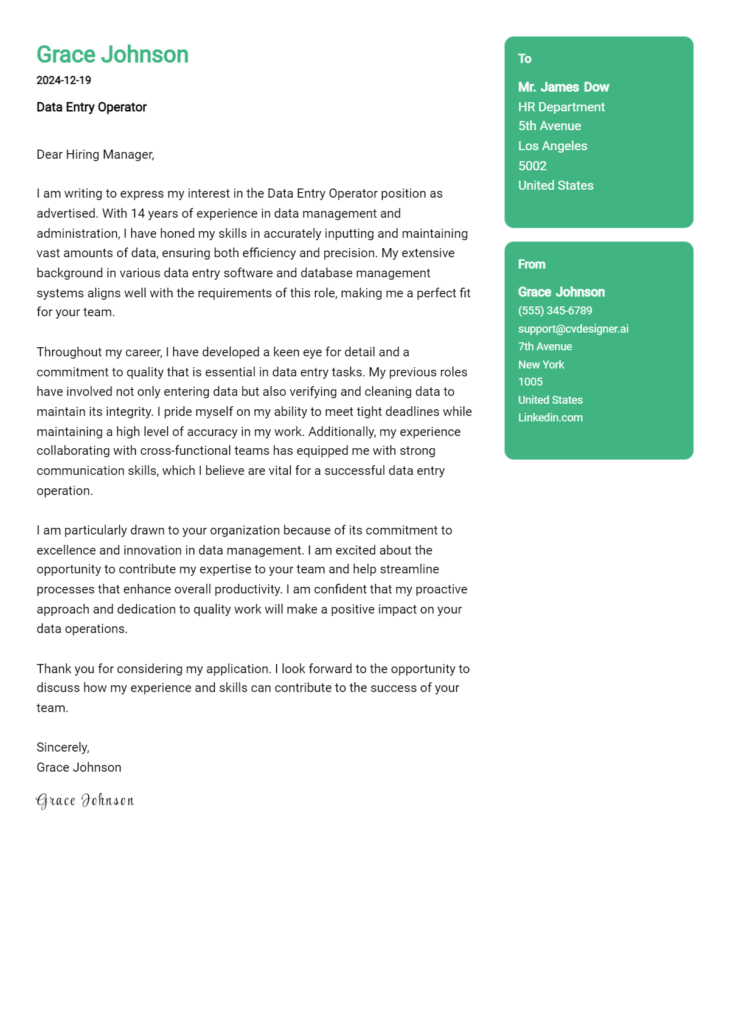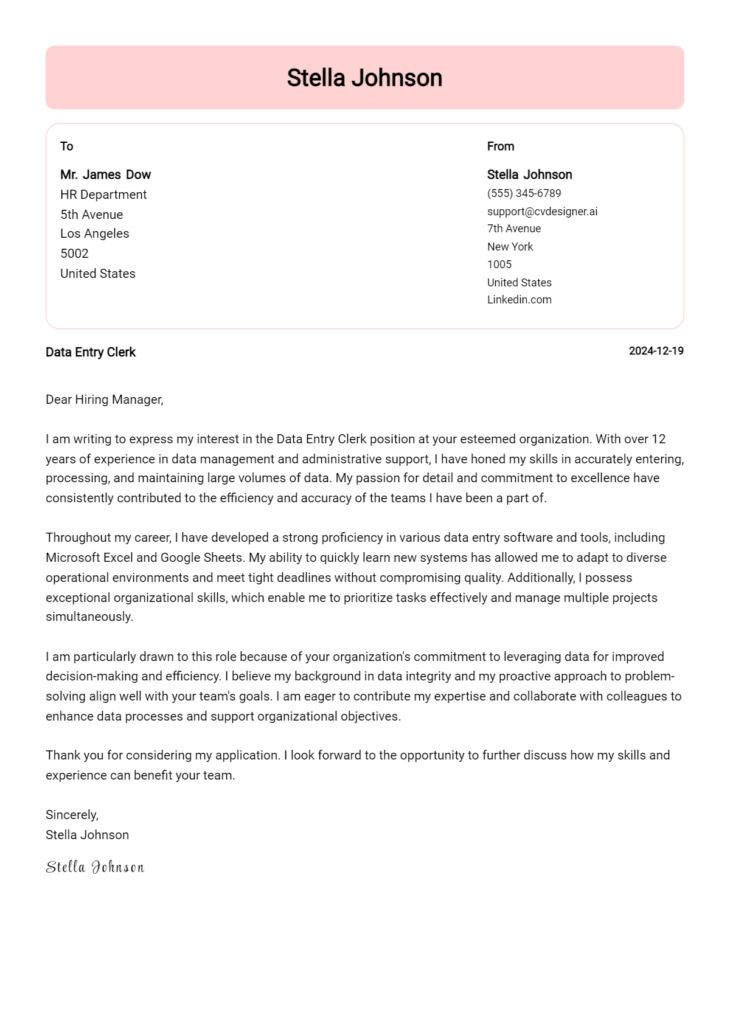Records Coordinator Cover Letter Examples
Explore additional Records Coordinator cover letter samples and guides and see what works for your level of experience or role.
How to Format a Records Coordinator Cover Letter?
Crafting a compelling cover letter is essential for a Records Coordinator, as it not only showcases your qualifications but also reflects your organizational skills and attention to detail. The format of your cover letter plays a significant role in making a strong first impression on hiring managers. A well-structured document demonstrates your ability to manage records efficiently, a crucial aspect of the role.
In this guide, we'll explore how to structure your cover letter effectively, providing insights and examples tailored to the Records Coordinator position.
We will focus on the key components of a professional cover letter, including:
- Cover Letter Header
- Cover Letter Greeting
- Cover Letter Introduction
- Cover Letter Body
- Cover Letter Closing
Each section is essential for highlighting your expertise and professionalism. Let’s break down each part and discuss how to create a standout cover letter for a Records Coordinator position.
Importance of the Cover Letter Header for a Records Coordinator
The header of a cover letter is crucial for establishing a professional tone and ensuring that your application is easily identifiable. For a Records Coordinator, clarity and professionalism are paramount, as they reflect the applicant's organizational skills and attention to detail—key qualities for the role. The header should include your contact information, the date, and the recipient's details, formatted clearly to enhance readability. A well-structured header not only helps the recipient quickly access your information but also sets the stage for the rest of the cover letter.
Strong Example
Jane Doe 123 Main Street Cityville, ST 12345 jane.doe@email.com (123) 456-7890 October 15, 2023 Mr. John Smith Records Manager ABC Corporation 456 Business Rd. Cityville, ST 12345
Weak Example
jane doe email: jane.doe@email.com 12345 10/15/23 john smith
The Importance of the Cover Letter Greeting
The greeting of your cover letter serves as the first impression you make on a potential employer, setting the tone for the rest of your application. A well-crafted greeting not only conveys professionalism but also demonstrates your attention to detail and commitment to the role you are applying for. By addressing the hiring manager directly, you personalize your letter, making it clear that you have taken the time to research the company and its team. Avoiding generic greetings like "To Whom It May Concern" is essential, as it can come off as impersonal and unengaged. If the hiring manager's name is not readily available, consider looking for it on the company’s website, LinkedIn, or calling the office for assistance. A personalized greeting can distinguish you from other candidates, showcasing your enthusiasm for the Records Coordinator position.
Strong Greeting Example
Dear Ms. Johnson,
Weak Greeting Example
To Whom It May Concern,
The Importance of a Well-Crafted Cover Letter Introduction for a Records Coordinator
A well-crafted cover letter introduction is crucial for a Records Coordinator position as it serves as the first impression to the hiring manager. It should not only capture their attention but also express genuine interest in the role while briefly showcasing relevant skills and achievements. A strong introduction sets the tone for the rest of the letter, highlighting the candidate's suitability for the position. Conversely, a weak introduction can fail to engage the reader and may miss an opportunity to effectively convey the candidate's qualifications.
Strong Example
Dear [Hiring Manager's Name], I am excited to apply for the Records Coordinator position at [Company Name], as I believe my extensive experience in managing and organizing complex data aligns perfectly with your needs. With over five years of hands-on experience in records management and a proven track record of implementing efficient filing systems, I am eager to contribute to your team and enhance your organizational processes.
Weak Example
To Whom It May Concern, I am writing to apply for the Records Coordinator position. I have done some work in this area and think I would be a good fit. I like working with data and have some experience with filing.
Purpose of the Cover Letter Body for a Records Coordinator
The cover letter body for a Records Coordinator serves as an opportunity for candidates to articulate their relevant skills and experiences while demonstrating their value to the company. This section should highlight specific projects or accomplishments that align with the responsibilities of the role, showcasing the candidate’s ability to manage records efficiently, ensure compliance with regulations, and facilitate information retrieval processes. By providing concrete examples of past achievements, such as successfully implementing a new electronic records management system or reducing retrieval times through improved organizational methods, candidates can effectively convey their qualifications and readiness to contribute to the organization.
Strong Example
Dear Hiring Manager, In my previous role as a Records Coordinator at XYZ Corporation, I successfully led a project to transition our paper-based filing system to a digital format, which resulted in a 40% reduction in retrieval time for critical documents. This initiative not only improved efficiency but also enhanced our compliance with industry regulations. My attention to detail and organizational skills were crucial in training staff on the new system, and I consistently received positive feedback for my ability to streamline processes while maintaining data integrity. I am excited about the opportunity to bring my expertise in records management and project leadership to your team at ABC Company. Sincerely, [Your Name]
Weak Example
Dear Hiring Manager, I have some experience in records management and I think I could be a good fit for the Records Coordinator position. In my last job, I did some filing and handling documents. I also helped with some computer systems. I believe I can do similar tasks at your company. Thank you for considering my application. Best, [Your Name]
Importance of the Cover Letter Closing for a Records Coordinator
The closing paragraph of your cover letter is crucial as it encapsulates your qualifications, reinforces your enthusiasm for the Records Coordinator position, and encourages the hiring manager to take the next steps, such as reviewing your resume or scheduling an interview. A well-crafted closing leaves a lasting impression and demonstrates your professionalism and genuine interest in the role. Below are examples of strong and weak closing paragraphs for a Records Coordinator cover letter.
Strong Example
Thank you for considering my application for the Records Coordinator position. With my extensive experience in records management and my commitment to maintaining organizational efficiency, I am excited about the opportunity to contribute to your team at [Company Name]. I look forward to discussing how my skills align with your needs and would be happy to provide further details during a personal interview. Please feel free to review my attached resume, and I hope to hear from you soon.
Weak Example
Thanks for reading my letter. I think I would be okay for the Records Coordinator job. You can look at my resume if you want. Let me know if you want to talk.
These tips will help candidates craft an effective cover letter for a Records Coordinator position. It's crucial to showcase not only your technical skills and problem-solving abilities but also your understanding of the Software Development Life Cycle (SDLC), your capacity for teamwork, and your passion for continuous learning. A well-structured cover letter can set you apart from other candidates by highlighting these essential qualities.
Tips for Writing a Cover Letter for a Records Coordinator
Highlight Your Technical Skills
Emphasize your proficiency with record management software and databases. Mention specific tools you are familiar with, such as Microsoft Excel, Access, or specialized record management systems. Providing examples of how you have utilized these tools to improve efficiency or accuracy in previous roles can strengthen your application.Demonstrate Problem-Solving Abilities
Use your cover letter to illustrate your problem-solving skills. Share a brief anecdote about a challenge you faced in records management and how you successfully resolved it. This not only shows your capability to handle issues but also your analytical thinking and initiative.Show Your Understanding of SDLC
Since records coordination often involves managing data throughout its lifecycle, demonstrate your knowledge of the Software Development Life Cycle (SDLC). Explain how your understanding of SDLC principles can aid in maintaining accurate records and ensuring compliance with regulations. This will show potential employers that you have a holistic view of records management.Emphasize Teamwork and Collaboration
Records Coordinators often work within teams to ensure smooth operations. Highlight your experience in collaborative projects and your ability to communicate effectively with colleagues. Mention any instances where your teamwork led to successful outcomes, such as improved processes or enhanced data accuracy.Express Your Passion for Continuous Learning
In a field that evolves with technology, showing a commitment to continuous learning is essential. Discuss any relevant certifications, courses, or workshops you have completed or plan to pursue. This demonstrates your proactive approach to professional development and your dedication to staying current in the industry.
For additional assistance in crafting your cover letter, consider using cover letter templates or a cover letter builder to streamline the process and ensure your application stands out.
Common Mistakes to Avoid in a Records Coordinator Cover Letter
Crafting a compelling cover letter is essential for securing a position as a Records Coordinator, as it serves as your first impression to potential employers. Avoiding common mistakes can significantly enhance your chances of standing out. Here are some pitfalls to watch out for:
Generic Greetings: Starting with "Dear Hiring Manager" can make your letter feel impersonal. Instead, research and address the letter to a specific person whenever possible.
Lack of Specificity: Failing to tailor your cover letter to the job description can be detrimental. Highlight relevant skills and experiences that align with the requirements of the Records Coordinator role.
Overly Lengthy Letters: Being verbose can dilute your message. Aim for a concise letter that maintains the reader's attention while effectively communicating your qualifications.
Ignoring Formatting: A poorly formatted cover letter can be hard to read. Ensure your letter follows a professional cover letter format, including clear headings and consistent font styles.
Spelling and Grammar Errors: Typos can undermine your professionalism. Proofread your letter multiple times and consider using tools or asking a friend to review it.
Focusing on Responsibilities Instead of Achievements: Highlighting tasks rather than accomplishments can weaken your appeal. Use quantifiable achievements to demonstrate your impact in previous roles.
Neglecting a Call to Action: Failing to express your enthusiasm for the position or a desire for an interview can leave the employer uncertain about your interest. Conclude with a strong statement that encourages further discussion.
By steering clear of these common mistakes, you can create a standout cover letter that enhances your application for a Records Coordinator position. For more guidance, check out these cover letter examples.
Cover Letter FAQs for Records Coordinator
What should I include in my cover letter for a Records Coordinator position?
In your cover letter, you should include your relevant experience in records management, data entry, and organizational skills. Begin by introducing yourself and stating the position you are applying for. Highlight your familiarity with record-keeping systems and technologies, as well as any certifications you may have, such as those from ARMA International. Discuss specific examples of how you've managed records efficiently in previous roles, emphasizing your attention to detail and ability to maintain confidentiality. Finally, express your enthusiasm for the position and how your skills align with the company’s goals, showcasing your understanding of their operations.
How can I demonstrate my attention to detail in my cover letter?
To demonstrate your attention to detail, incorporate specific examples from your work history that illustrate your meticulousness. For instance, mention a project where you successfully organized a complex filing system or corrected discrepancies in records. Use metrics where possible, such as "reduced retrieval time by 30% after implementing a new categorization system." Additionally, ensure your cover letter is free of spelling and grammatical errors. The clarity and professionalism of your writing itself serve as a testament to your meticulous nature, reinforcing your ability to handle sensitive records with precision.
Should I tailor my cover letter for each Records Coordinator application?
Yes, tailoring your cover letter for each application is highly recommended. Customizing your cover letter shows potential employers that you are genuinely interested in their specific role and organization. Research the company’s values and challenges to align your skills and experiences with their needs. For instance, if the job description emphasizes digital record management, highlight your proficiency with relevant software or systems. By making these connections, you not only demonstrate your qualifications but also your commitment to contributing to the organization’s success, which can set you apart from other candidates.
How long should my cover letter be for a Records Coordinator position?
Your cover letter should ideally be one page long, consisting of three to four paragraphs. Aim for a concise yet comprehensive format that allows you to highlight your qualifications without overwhelming the reader. Start with a brief introduction, followed by a paragraph detailing your relevant experience and skills. Include another paragraph that connects your background to the specific needs of the organization, and conclude with a strong closing statement expressing your enthusiasm for the role and inviting further discussion. Keeping it concise ensures you maintain the reader's attention while effectively conveying your qualifications.
Build your Cover Letter in minutes
Use an AI-powered cover letter builder and have your letter done in 5 minutes. Just select your template and our software will guide you through the process.

